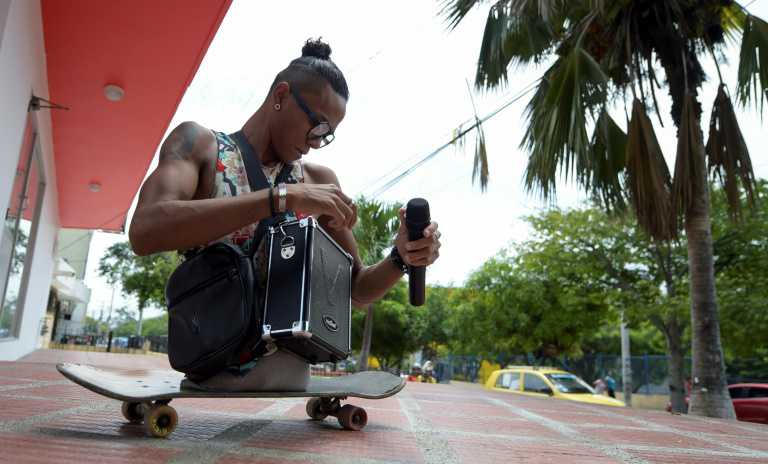Legless Venezuelan rapper, surfer, overcoming odds in Colombia
06 October, 2018

Venezuelan migrant Alfonso Mendoza was born without legs. Abandoned by his parents, he contemplated suicide. But everything about him shouts: “Believe in Yourself!” — ask anyone who attends his motivational classes.
His main mode of movement is on a shabby skateboard, which he kept close during a dangerous crossing into Colombia with his wife.
“It was difficult because of the guerrillas and the Venezuelan National Guard; it is a very difficult journey.”
The skateboard, its wheels squeaking over the rutted path outside his wood and corrugated iron shack, has been a constant since he swapped his wheelchair for it.
Lithe and muscular, Alca — as he prefers to be known — hoists himself into buses. With a boom box and microphone, the charming, good-looking 25-year-old perches on a railing and belts out rap songs.
The passengers look on, fascinated at the apparent trompe l’oeil as he appears to levitate on the railing, the lower half of his body missing.
But it’s not part of an elaborate magic act, as everyone can see when Alca eases himself down onto his skateboard, and rolls down the aisle to collect his tips.
Rudimentary it may be, but the mobility provided by his skateboard appears to allow him to move more swiftly and easily than most able-bodied people in Barranquilla, the Colombian port that has become his adopted home.
On a good day, he can come home with 30,000 pesos — around $10. A monthly salary back home in Venezuela is just $30.
Severely disabled since birth, Mendoza added another level of hardship to his life this year when he joined the legion of Venezuelan migrants spilling over the border from Colombia’s poverty-wracked neighbor.
In Barranquilla, a new challenge awaits: bringing up baby Auralys, their little girl born just last month.
“At the moment when I knew I was going to be a father, I had to come to Colombia.”
“Despite his disability, he is much more complete than other parents, since we have everything we need, he has always been there for us,” says his wife Mileidy Pena.
Later, he goes to the skate park to work out, using his arms to rapidly flip the board under him, barely getting a glance from the other boarders. Acceptance didn’t always come so easily.
After being abandoned as a child, he was placed under the care of his grandmother, who died when he was nine years old.
TAG(s):
